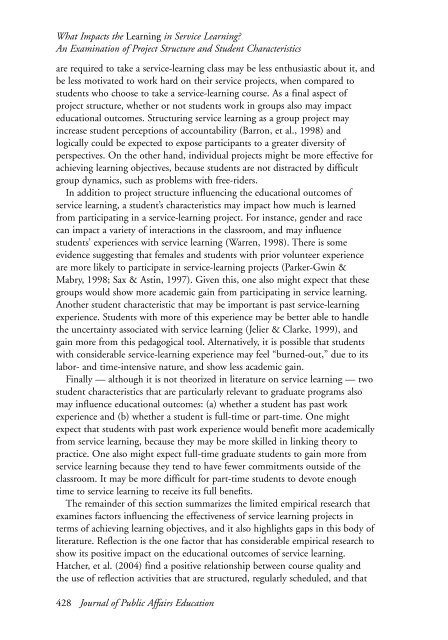JOURNAL OF PUBLIC AFFAIRS EDUCATION - National ...
JOURNAL OF PUBLIC AFFAIRS EDUCATION - National ...
JOURNAL OF PUBLIC AFFAIRS EDUCATION - National ...
You also want an ePaper? Increase the reach of your titles
YUMPU automatically turns print PDFs into web optimized ePapers that Google loves.
What Impacts the Learning in Service Learning?<br />
An Examination of Project Structure and Student Characteristics<br />
are required to take a service-learning class may be less enthusiastic about it, and<br />
be less motivated to work hard on their service projects, when compared to<br />
students who choose to take a service-learning course. As a final aspect of<br />
project structure, whether or not students work in groups also may impact<br />
educational outcomes. Structuring service learning as a group project may<br />
increase student perceptions of accountability (Barron, et al., 1998) and<br />
logically could be expected to expose participants to a greater diversity of<br />
perspectives. On the other hand, individual projects might be more effective for<br />
achieving learning objectives, because students are not distracted by difficult<br />
group dynamics, such as problems with free-riders.<br />
In addition to project structure influencing the educational outcomes of<br />
service learning, a student’s characteristics may impact how much is learned<br />
from participating in a service-learning project. For instance, gender and race<br />
can impact a variety of interactions in the classroom, and may influence<br />
students’ experiences with service learning (Warren, 1998). There is some<br />
evidence suggesting that females and students with prior volunteer experience<br />
are more likely to participate in service-learning projects (Parker-Gwin &<br />
Mabry, 1998; Sax & Astin, 1997). Given this, one also might expect that these<br />
groups would show more academic gain from participating in service learning.<br />
Another student characteristic that may be important is past service-learning<br />
experience. Students with more of this experience may be better able to handle<br />
the uncertainty associated with service learning (Jelier & Clarke, 1999), and<br />
gain more from this pedagogical tool. Alternatively, it is possible that students<br />
with considerable service-learning experience may feel “burned-out,” due to its<br />
labor- and time-intensive nature, and show less academic gain.<br />
Finally — although it is not theorized in literature on service learning — two<br />
student characteristics that are particularly relevant to graduate programs also<br />
may influence educational outcomes: (a) whether a student has past work<br />
experience and (b) whether a student is full-time or part-time. One might<br />
expect that students with past work experience would benefit more academically<br />
from service learning, because they may be more skilled in linking theory to<br />
practice. One also might expect full-time graduate students to gain more from<br />
service learning because they tend to have fewer commitments outside of the<br />
classroom. It may be more difficult for part-time students to devote enough<br />
time to service learning to receive its full benefits.<br />
The remainder of this section summarizes the limited empirical research that<br />
examines factors influencing the effectiveness of service learning projects in<br />
terms of achieving learning objectives, and it also highlights gaps in this body of<br />
literature. Reflection is the one factor that has considerable empirical research to<br />
show its positive impact on the educational outcomes of service learning.<br />
Hatcher, et al. (2004) find a positive relationship between course quality and<br />
the use of reflection activities that are structured, regularly scheduled, and that<br />
428 Journal of Public Affairs Education

















